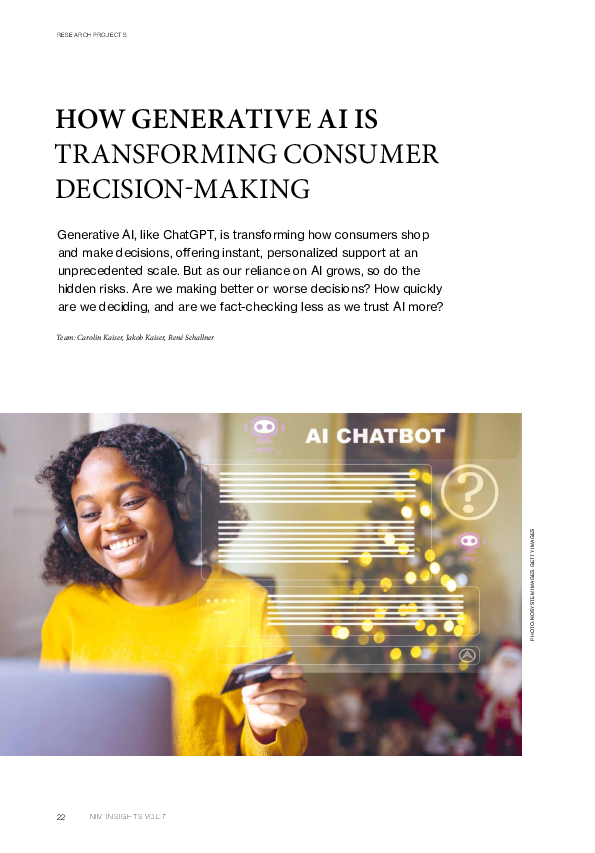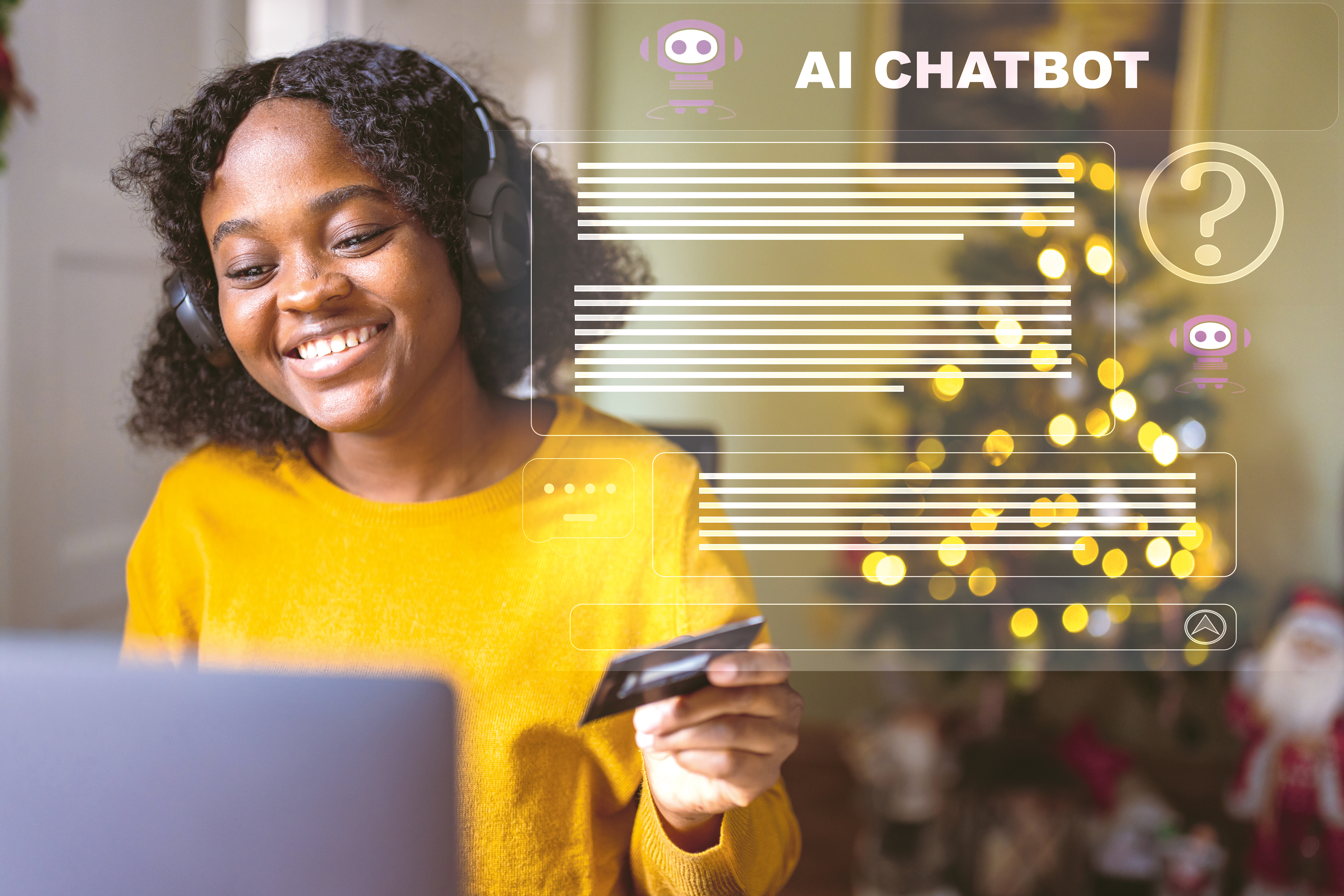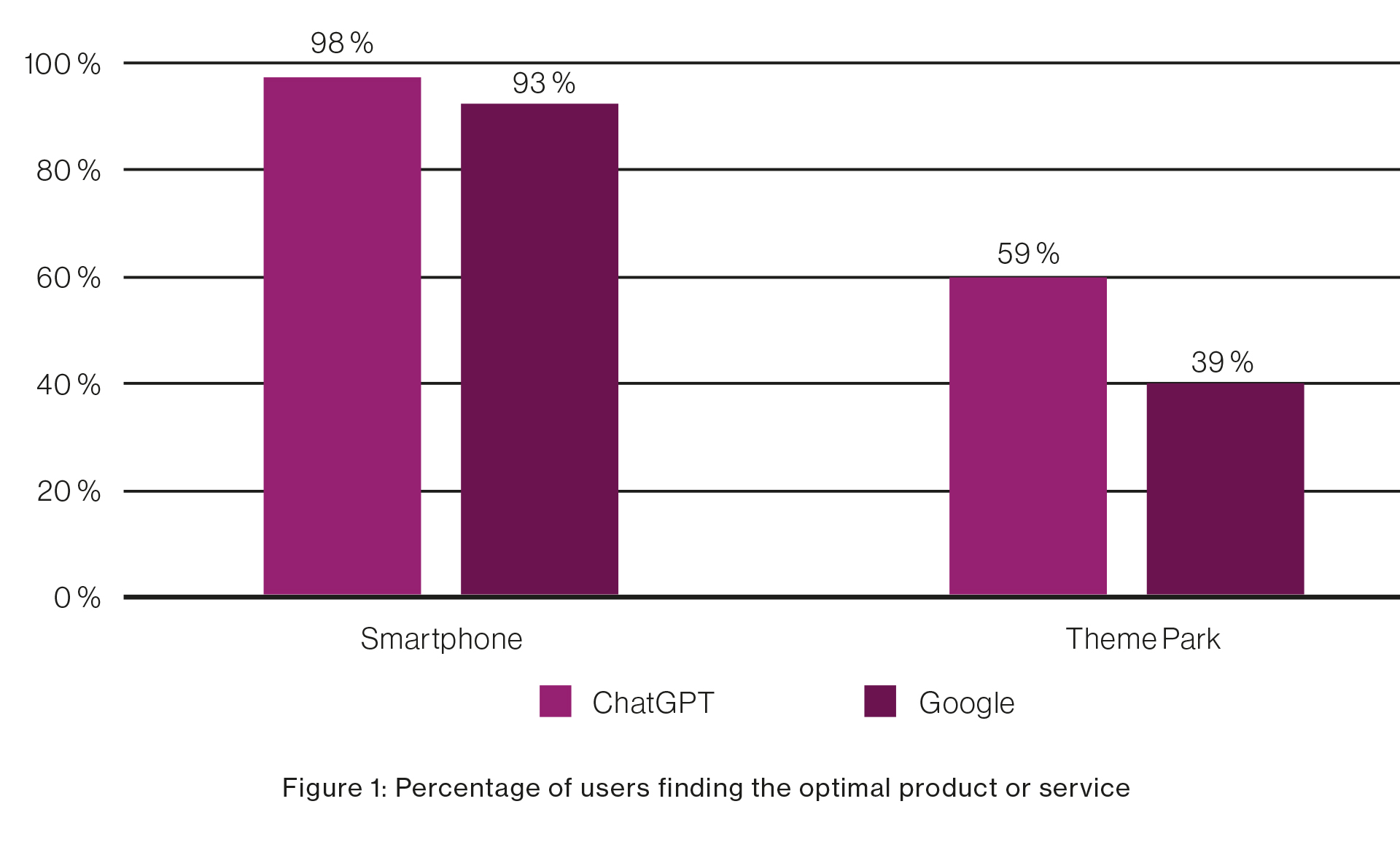Research
How Generative AI is Transforming Consumer Decision-making
Generative AI, like ChatGPT, is transforming how consumers shop and make decisions, offering instant, personalized support at an unprecedented scale. But as our reliance on AI grows, so do the hidden risks. Are we making better or worse decisions? How quickly are we deciding, and are we fact-checking less as we trust AI more?
Generative AI, particularly tools like ChatGPT, has seen explosive growth since its introduction in late 2022. With over 300 million weekly active users by 2024, AI-powered assistants are reshaping how consumers search for and process information about products and services. The widespread appeal of these tools stems from their ability to provide instant, personalized, and round-the-clock support, enabling users to make faster and more informed purchase decisions. However, leveraging generative AI effectively is not without challenges. While AI-generated content often appears professional and authoritative, it lacks transparency regarding its sources, selection criteria, and accuracy. AI tools can even produce “hallucinated” or fabricated results, making fact-checking an essential skill for consumers. This study investigates the impact of generative AI on consumer decision-making, focusing on two key areas:
- Decision Efficiency & Effectiveness: How do AI tools infuence the speed and accuracy of consumer choices?
- Behavioral Changes: What factors drive consumers to use AI effectively, and how do their search and purchasing behaviors evolve in response?
To understand how generative AI influences consumer decision-making, a team of researchers from the Nuremberg Institute for Market Decisions and the Vorarlberg University of Applied Sciences conducted an online experiment followed by interviews to gather deeper insights into consumer behavior.
How AI and Traditional Searches Compare in Consumer Decision-Making
This study examined how consumers use ChatGPT, an AI-powered search tool, versus Google, a traditional search engine, when making product-related decisions. A total of 1,503 U.S. participants were included in the final analysis after filtering out noncompliant data. Each participant was assigned a decision-making task: selecting the best option among three alternatives in either the smartphone or theme park category based on predefined criteria. To create a realistic online research experience, researchers developed a custom browser application that tracked participants’ search behavior, time spent, and websites visited. Participants were randomly assigned either ChatGPT or Google as their primary research tool but could visit other websites if needed. The study measured both decision speed and accuracy to assess efficiency and effectiveness. After completing the task, participants filled out a survey evaluating their experience, including their satisfaction with the tool, task enjoyment, and attitudes toward AI-powered searches.
AI vs. Traditional Searches: Key Findings
The results revealed that ChatGPT outperformed Google in both search accuracy and speed: Higher Accuracy: ChatGPT users were signifcantly more likely to select the correct product or service compared to Google users (see Figure 1). This advantage was particularly strong for complex searches, such as those involving theme parks, where relevant information was harder to find. While 59% of ChatGPT users identified the best theme park based on the predefined criteria, only 39% of Google users did.
Faster Decision-Making: ChatGPT users completed their searches more quickly than those using Google.
However, despite ChatGPT leading to more efficient and accurate decision-making, participants still preferred Google over ChatGPT for future searches, with habit and trust in traditional search engines playing a key role in this preference.
Browsing Behavior: Fewer Clicks With AI
The study also explored how each tool influenced browsing habits:
- ChatGPT users relied primarily on AI-generated results, with only 12% visiting external websites.
- Conversely, 73% of the Google users explored external sites for further information
For Google users, clicking through multiple sources was key to success, reinforcing traditional search behaviors wherein consumers compare information across various websites. In contrast, ChatGPT users trusted the AI-generated recommendations without further verification, highlighting a fundamental shift in search dynamics.
Understanding Consumer Behavior With AI-Powered Search
To complement the quantitative study, in-depth interviews were conducted with U.S. consumers to explore how they engage with AI tools like ChatGPT and Microsoft Copilot for purchasing decisions. Theese 25-minute interviews examined how consumers discovered AI, their motivations for using it, and its impact on their search habits and decision-making. Consumers are increasingly adopting AI-powered search through word of mouth, social media, and curiosity-driven experimentation. While initial skepticism exists, many users quickly recognize AI’s efficiency and objectivity, leading to a growing reliance on these tools for product research. The study identified three main ways consumers use AI in decision-making:
- Unbiased Recommendations: AI’s perceived neutrality helps consumers filter out marketing bias.
- Product Discovery and Comparison: AI simplifies the search process by summarizing reviews and helping customers understand their needs.
- Product Insights and Maintenance: Many turn to AI for guidance on product usage, troubleshooting, and long-term care.
Although AI search tools improve efficiency, accuracy concerns remain, particularly regarding pricing and product availability, emphasizing the need for better integration with shopping platforms.
Overall, AI-powered search is reshaping consumer decision-making by organizing information, structuring choices, and offering personalized insights. Many users find AI to be a motivating force, reducing the effort required in complex research. As AI tools continue to evolve, consumers are gradually shifting away from traditional search engines, favoring AI-driven recommendations for a faster, more structured decision-making experience.
Project team
- Dr. Carolin Kaiser, Head of Artificial Intelligence, NIM, carolin.kaiser@nim.org
- Dr. Jakob Kaiser, Senior Researcher, NIM, jakob.kaiser@nim.org
- René Schallner
Cooperation partner
- Prof. Dr. Sabrina Schneider, Hochschule Vorarlberg
Contact



![[Translate to English:] [Translate to English:]](/fileadmin/_processed_/1/2/csm_CK_NIM_01_58bed63910.png)